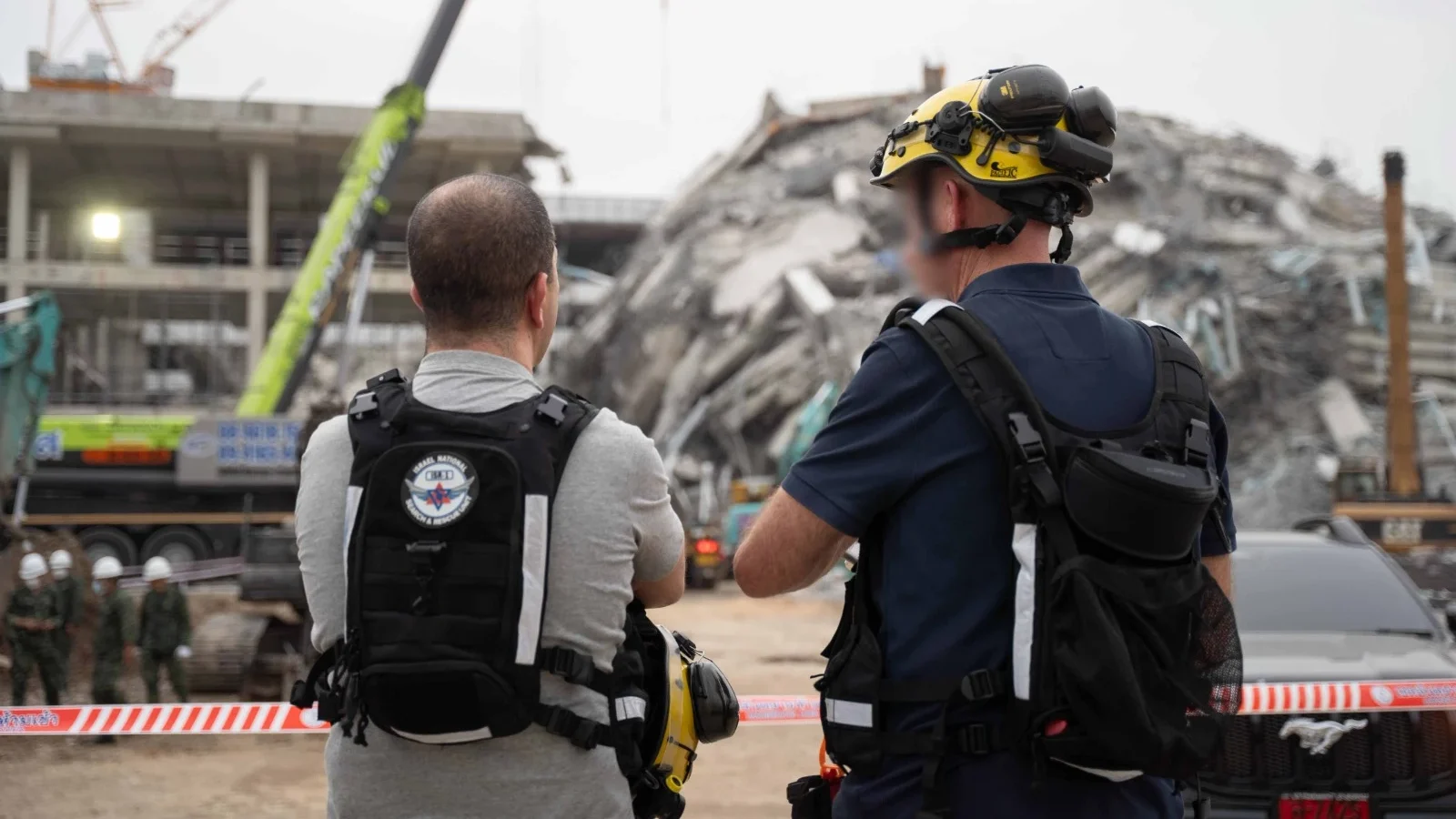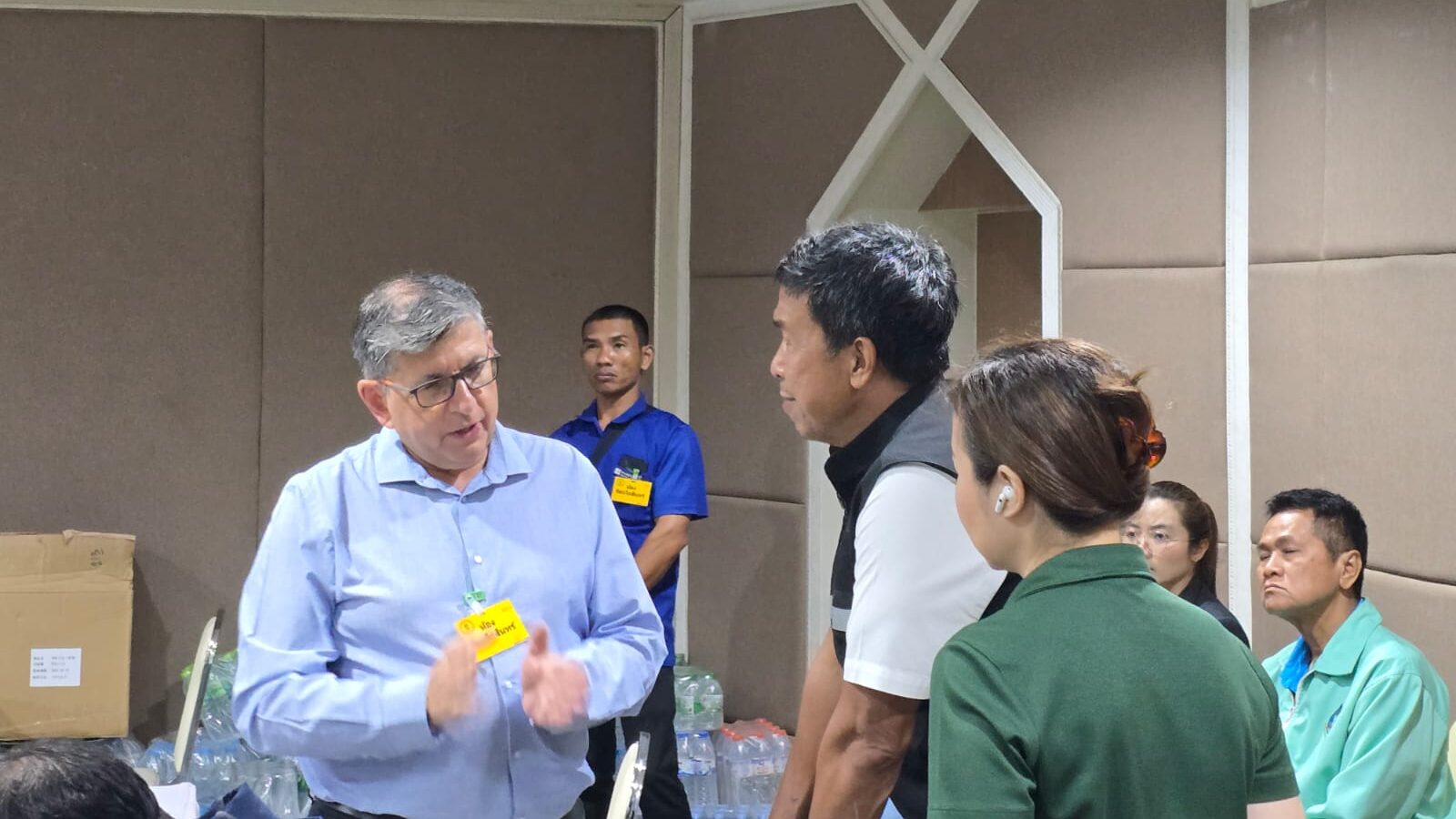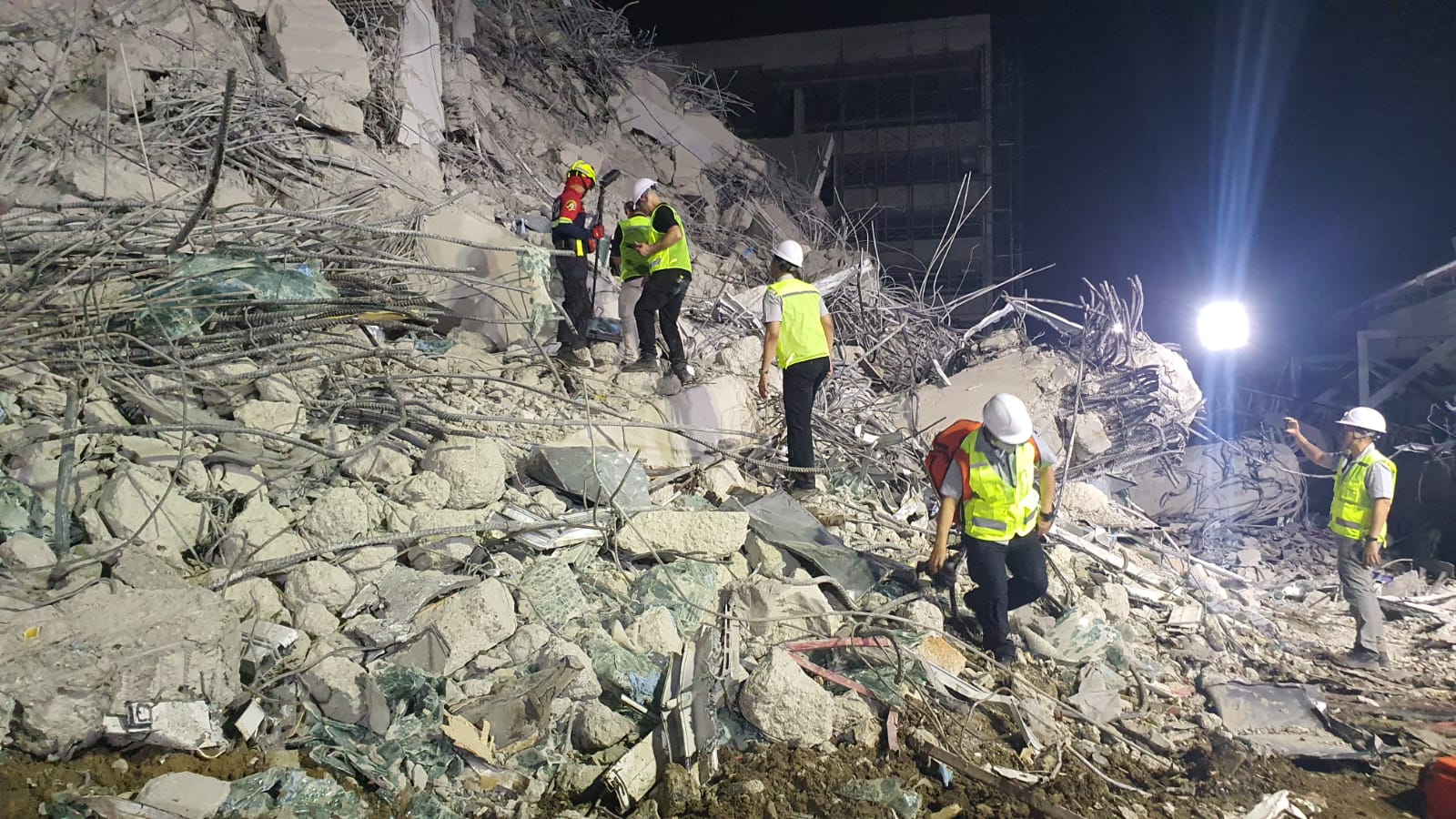‘Every Second Counts’: Israeli Rescue Teams Aid Bangkok Earthquake Victims
Multiple Israeli groups have dispatched to Thailand and Myanmar to support the search-and-rescue efforts following Friday’s devastating earthquakes
On Sunday night, an Israeli high-tech search-and-rescue team located the first survivor in a collapsed building in Bangkok following the earthquake that struck the region over the weekend. The Camero-Tech rescue team used technology capable of detecting people and objects behind walls to find the survivor, who was buried under about 15 feet of rubble.
Arriving at 1 a.m. on Sunday, they were the first international search-and-rescue team on the ground in Bangkok. They brought two models of Camero-Tech’s Xaver through-wall imaging systems to assist with search-and-rescue efforts.
When you save one person, you save the whole world—that is what it means to be on site for us.
“We feel very proud when we save even one person,” Shaul Sharbany, global marketing and sales director at Camero-Tech, told The Media Line. “When you save one person’s life, you save the lives of their family members and friends. When you save one person, you save the whole world—that is what it means to be on site for us.”
The two-person Camero-Tech team was dispatched following the earthquakes in Southeast Asia on Friday. A 7.7-magnitude earthquake struck Myanmar, followed by a 6.7-magnitude aftershock that also impacted Bangkok, the capital of Thailand.
In Bangkok, one building collapsed, and other buildings suffered structural damage. According to the latest reports, at least 2,000 people were killed in Myanmar and 17 in Thailand. More than 3,500 were injured, and hundreds are still missing.
In addition to the Camero-Tech team, Israel sent a larger delegation of over 20 people to Thailand to assist in the search-and-rescue efforts. An official statement said that Prime Minister Benjamin Netanyahu made the decision to dispatch the delegation—composed of members of the Israeli military’s Home Front Command—jointly with the Foreign and Defense Ministries.

Members of the Israeli military’s search-and-rescue delegation to Bangkok survey the damage to the destroyed building on March 30, 2025. (IDF)
The delegation is led by Col. (res.) Yossi Pinto, commander of the Israeli military’s national reserve search-and-rescue unit. On Monday, the team released footage from the field showing its members—engineering and civil affairs officers from the National Rescue Unit—working alongside Thai authorities. The delegation’s mission began with a situational assessment and sharing of Israeli technological expertise, coordinated by the Home Front Command’s International Cooperation Unit.
The nonprofit organization IsraAID also deployed an emergency team to Myanmar on Sunday. Tali Groshaus, deputy director of Emergencies and Operations for IsraAID, told The Media Line that the team is assessing urgent needs, with a focus on access to safe water, sanitation, and hygiene. Additional psychosocial support and public health specialists are expected to join based on local requirements.
This marks IsraAID’s third emergency response in Myanmar, following Cyclone Nargis in 2008 and major flooding in 2015. In recent years, IsraAID has responded to earthquakes in Morocco, Turkey, Haiti, Indonesia, Nepal, Italy, and Japan.
This holiday season, give to:
Truth and understanding
The Media Line's intrepid correspondents are in Israel, Gaza, Lebanon, Syria and Pakistan providing first-person reporting.
They all said they cover it.
We see it.
We report with just one agenda: the truth.


IsraAID was established more than 20 years ago to respond to global crises by sharing Israeli expertise in multiple areas—including mental health, psychosocial support, water filtration systems, public health, and more. The organization currently operates offices in nine countries.
We, as an Israeli organization, have been taking this expertise to the world and learning from our partners and communities. We are privileged to support these communities at this time.
“We, as an Israeli organization, have been taking this expertise to the world and learning from our partners and communities,” Groshaus said. “We are privileged to support these communities at this time.”
The Israeli Foreign Ministry said that its embassies were checking on the status of Israelis in Myanmar and Thailand. As of Sunday, there were no reports of injured Israeli citizens.
Experts fear that the full death toll may take weeks to become clear.
Camero-Tech’s Sharbany said that when the group heard about the disaster, they immediately decided to assist by traveling to the country and working alongside their local partner.
That’s an outlier for the company, which usually does not send team members to disaster sites and instead provides equipment for customers to use on location. Sharbany noted that the Xaver system has previously been used in earthquake zones in Turkey, Mexico, and other countries.
When the team got to the airport in Bangkok, they met up with their local partners and got to work immediately, continuing nonstop for more than 18 hours on the first day.
“It is a very difficult scenario,” Sharbany said. “It is a big mess.”
The Xaver systems run on advanced ultra-wideband radio wave technology and provide real-time detection and precise location of live survivors trapped under debris, Sharbany said. The system is designed to locate living people through use of patented, proprietary algorithms. It can function from up to 20 yards away, and the user-friendly technology requires only three buttons to operate.
Camero-Tech had previously sold some of its systems to Thailand and decided to bring two additional models with them.
“In such kinds of disasters, the survivors are usually wounded and trapped in very narrow spaces,” Sharbany said. “It is very hard for them to breathe. Our system can sense even the smallest movement of a person. This means that if he is trapped but alive and his chest is going up and down even a little bit, our system can sense him.”
Our system can sense even the smallest movement of a person. This means that if he is trapped but alive and his chest is going up and down even a little bit, our system can sense him.
Once the technology detects a survivor, operators communicate that information to the national rescue organization. From there, a team begins excavating at the location, carefully shaving off layers of stone or debris blocking access to the survivor.
On Sunday, the Camero-Tech team worked closely with Bangkok’s local urban search-and-rescue unit. They sent Sharbany’s colleague, Ilan Abramovich—Camero-Tech’s vice president of marketing and sales—up in a crane to the top of the collapsed building to search for survivors.
Sharbany said the collapsed building in Bangkok presents several unique challenges. Part of the structure has suffered a “pancake collapse,” where one floor falls onto the one below it, continuing down through multiple levels. In such cases, survival is rare.
The second challenge is that the building was under construction when it collapsed. Unlike in established residential or office buildings, where people have a good idea of who was inside at the time of the collapse, this site had around 100 construction workers present—and their identities were not well documented.

A member of the Camero-Tech delegation speaking with Thai rescue workers in Bangkok on March 30, 2025. (Courtesy of Camero-Tech)
Sharbany said that the few survivors located near the building’s entrance were pulled out quickly. “Local authorities think at least 60 or 70 people remain trapped, and their condition is unknown,” he said.
Every second counts. The more hours go by, the more difficult it is to find people alive.
“Every second counts,” Sharbany added. “The more hours go by, the more difficult it is to find people alive.”

